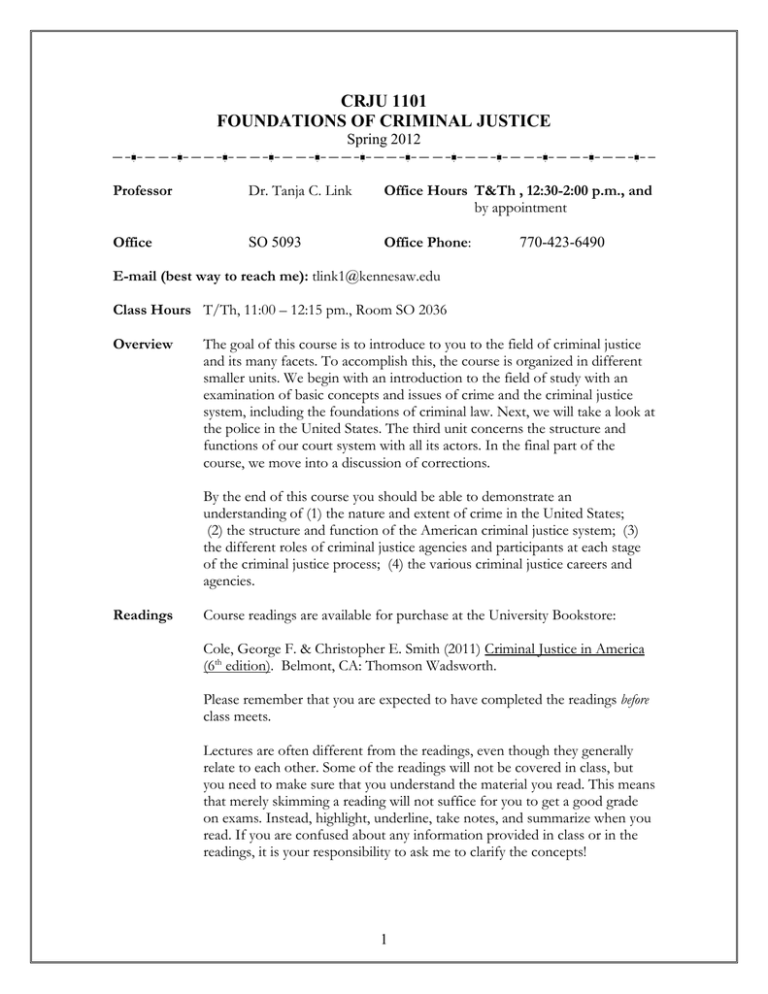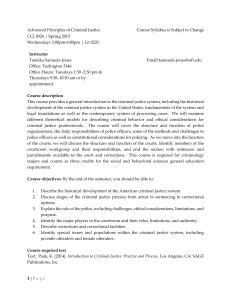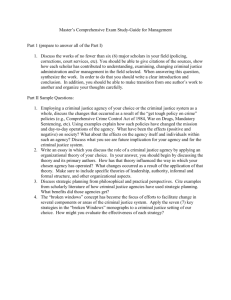CRJU 1101-08 Link - Kennesaw State University
advertisement

CRJU 1101 FOUNDATIONS OF CRIMINAL JUSTICE Spring 2012 Professor Dr. Tanja C. Link Office Hours T&Th , 12:30-2:00 p.m., and by appointment Office SO 5093 Office Phone: 770-423-6490 E-mail (best way to reach me): tlink1@kennesaw.edu Class Hours T/Th, 11:00 – 12:15 pm., Room SO 2036 Overview The goal of this course is to introduce to you to the field of criminal justice and its many facets. To accomplish this, the course is organized in different smaller units. We begin with an introduction to the field of study with an examination of basic concepts and issues of crime and the criminal justice system, including the foundations of criminal law. Next, we will take a look at the police in the United States. The third unit concerns the structure and functions of our court system with all its actors. In the final part of the course, we move into a discussion of corrections. By the end of this course you should be able to demonstrate an understanding of (1) the nature and extent of crime in the United States; (2) the structure and function of the American criminal justice system; (3) the different roles of criminal justice agencies and participants at each stage of the criminal justice process; (4) the various criminal justice careers and agencies. Readings Course readings are available for purchase at the University Bookstore: Cole, George F. & Christopher E. Smith (2011) Criminal Justice in America (6th edition). Belmont, CA: Thomson Wadsworth. Please remember that you are expected to have completed the readings before class meets. Lectures are often different from the readings, even though they generally relate to each other. Some of the readings will not be covered in class, but you need to make sure that you understand the material you read. This means that merely skimming a reading will not suffice for you to get a good grade on exams. Instead, highlight, underline, take notes, and summarize when you read. If you are confused about any information provided in class or in the readings, it is your responsibility to ask me to clarify the concepts! 1 Changes in the reading schedule may occur and will be announced in class or on the course website. It is your responsibility to get this information. Grades EXAMS (70% of final grade). Grades depend, first, on four noncumulative exams. Tests cover lecture, text and readings, and may consist of multiple-choice questions, true/false questions, and short answer questions. Exams will be taken online (GA VIEW) during regular class hours. Details will be given in class. Exams are scheduled well in advance so discretionary activity should be scheduled around these dates. Missed exams will be counted as zeros except for extraordinary circumstances. Please note that any arrangements have to be made with me before the exam in order to be allowed to make up an exam. DO NOT COME TO ME WITH EXCUSES AFTER THE EXAM! QUIZZES (20% of final grade) Grades depend also on various unannounced reading quizzes given throughout the semester. You are responsible for attending class regularly and making sure that you are not missing quizzes. Quizzes cannot be made up. If your absence is excused, the quiz will not count against you. Otherwise, you receive a zero – no exceptions! If you come to class late and a quiz is in progress you will not be allowed to take the quiz! ATTENDANCE (10% of final grade). You are an adult, and it is your decision whether and how often you attend class. However, success is not likely if many classes are missed. Quizzes, exams, and assignments cannot be made up if you missed class for an unexcused reason. Attendance will be taken every class at the beginning of lecture. It is your responsibility to sign the attendance sheet. Important: The sign-in sheet is your indication that you attended class. It is a violation of the academic honor code to sign another student in or to have another student sign in for you, and/or to sign-in and leave class. Attendance grades will be as follows: 0 classes missed = 100 3 classes missed 1 class missed = 95 4 classes missed 2 classes missed = 90 5+ classes missed 2 = 80 = 70 =0 Final letter grades will be given on the following scale: A 100 – 90 B 89.9 – 80 C 79.9 – 70 D 69.9 – 60 F 59.9 - 0 Other Policies Georgia VIEW. This course has a course website. The syllabus and other important information is posted on Georgia VIEW. Exams will be taken on Georgia VIEW as well. It is your responsibility to keep abreast with schedule changes, assignments, and other things posted on Georgia VIEW. Cell phones. All cell phones and other portable electronic devices must be turned off and stowed away during class – NO EXCEPTIONS. I realize that you don’t want to miss out on the many exciting things that happen out in the world during class time, but since you are there voluntarily, I expect you to pay your full attention to what is happening in class. If I see your phone I will assume you are playing, and I will ask you to leave the class and expect you to comply. Computers. In a similar vein, laptops may be used in the front row of class for note-taking purposes only. If I find you updating your facebook or google+ page or otherwise surfing the internet, you will be asked to pack up and leave. Academic Honesty. You are expected to do your own work. Violations of academic integrity will not be tolerated, and will be dealt with in the appropriate manner. Cheating, plagiarism, and destruction of course materials violate the rules of the University. Such violations of the rules regarding academic honesty can lead to a failing grade in the course and expulsion from the University. Instances of academic dishonesty will be reported to appropriate University officials as required by University rules and procedures. You are expected to be familiar with the content of the Student Code of Conduct, as published in the Undergraduate and Graduate Catalogs. Disruptive Behavior. This course is organized to encourage open, respectful exchanges on sometimes sensitive issues. Anyone perceived to conduct him/herself in such a manner as to obstruct or disrupt, or attempt to obstruct or disrupt, the class or its learning activities will be given a verbal warning and may be asked to excuse her/himself from the class period in which the conduct occurred. Further disruptive conduct may be reported and be subject to disciplinary procedures according to the KSU Student Conduct Regulations. Students who are found guilty of such misconduct may be subject to immediate dismissal from the institution. In addition, these violations of state law may also be subject to criminal action beyond the University disciplinary process. 3 Disability. If you have a documented disability that requires academic accommodations, please see me as soon as possible during scheduled office hours. In order to receive accommodations in this course, students must visit the Office for disAbled Student Support Services and make an appointment to arrange an individual assistance plan. In most cases, certification of disability is required. Course Schedule The syllabus is a tentative and general plan for the course. Adjustments may have to be made and will be announced in class or on Georgia VIEW. 1/10 Course Introduction 1/12 The Criminal Justice System Chapter 1 1/17 1/19 Types of Crimes Causes of Crime Victimization & the Impact of Crime Chapter 2 (37-50) Chapter 2 (55 – 64) Chapter 2 (50-54) 1/24 Foundations of Criminal Law and Substantive Criminal Law Chapter 3 (67-80) 1/26 Procedural Criminal Law Chapter 3 (80-95) 1/31 Exam 1 ONLINE! 2/2 Development of Police in the US & Law Enforcement Agencies Chapter 4 (97-108) 2/7 Chapter 4 (108– 114) 2/14 Police Functions, Organizations, Policy, Actions, and the Community Police Officers and the Police Subculture 2/16 Police Response & Action, Services, and Issues in Patrolling Chapter 5 (136-150) 2/21 Special Issues in Policing: Abuse of Power & Civic Accountability Special Issues in Policing: Technology, Homeland Security, and Private Policing Police and Constitutional Law Chapter 6 (186-194) 2/28 3/1 4 Chapter 4 (109 – 118) Chapter 5 (152-164) Chapter 6 (167-185) 3/13 Police and Constitutional Law (cont) 3/15 Exam 2 ONLINE! 3/20 Structure & Function of Courts, Judges, and Prosecutors Chapter 7 (200-217) 3/22 Defense Attorneys and the Courtroom Chapter 7 (217-228) 3/27 Pretrial Procedures: Bail, Pretrial Detention, and Plea Bargaining Chapter 8 (231-247) 3/29 The Criminal Trial and Appeals Chapter 8 (247-259) 4/3 Punishment & Sentencing Chapter 9 4/5 Exam 3 ONLINE! 4/10 Development & Organization of Corrections Chapter 10 (294-309) 4/12 The Law of Corrections & Correctional Policy Trends Chapter 10 (309-323) 4/17 Community Corrections: Probation and Intermediate Sanctions Chapter 11 (325-341) 4/19 Chapter 12 (343-353) 4/24 Goals of Incarceration, Prison Organization, and Correctional Officers Prisoners and Prison Society 4/26 Reentry into the Community Chapter 13 (377-395) TBA FINAL EXAM ONLINE! 5 Chapter 12 (353-375)





